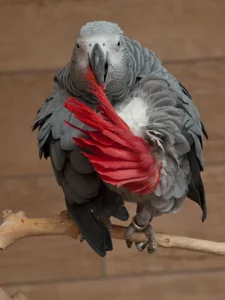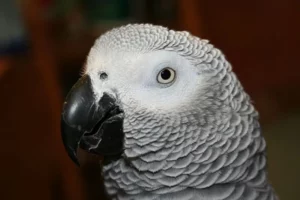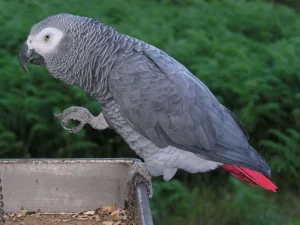African grey parrots are among the smartest birds ornithologists have ever observed. They are being studied for their lifespan in captivity and as pet birds.
In captivity, an African grey parrot can have a lifespan of up to 50 years (approx.). However, this duration will vary depending on different external factors, mostly the environment in which it is living. Other factors to influence include diet, lifestyle, health, and so on.
If you are going to get an African grey parrot or already have one, there might be so many other questions associated with its longevity. We are ready to address all of your concerns in this post. We’ll also emphasize what you can do to give your bird a long and fulfilling life in captivity.
Where do African grey parrots live in captivity?
If you’re considering getting an African grey parrot, you must be certain of its home. In other words, you must know where these birds live in captivity.
An African grey parrot lives in a cage as a pet or in captivity. It finds refuge and safety in the cage. But it’s crucial to pick the cage wisely by considering a few factors, like its size, design, etc.

Get a cage that allows the bird to flap its wings correctly if you intend to make the cage the bird’s permanent home. Additionally, watch that it doesn’t flap its wings into the sides of the cage. A swing and a ton of toys are also a plus.
How do African grey parrots live in captivity?
African grey parrots can live amazingly well and happily in captivity if given the proper care and upkeep. As long as you give them the proper stimulation, training, food, and water, they typically do not have any problems living in captivity as pets.
African grey parrot diet in captivity
After the cage, the African grey parrot’s diet should be considered next. So what do these birds eat in captivity?
The best diet for pet parrots, including African greys, is pellets. However, you should be aware that various pellet food compositions are available for different stages of a bird’s life. Additionally, pellets’ flavors, colors, forms, and sizes vary.
Don’t fill 100% of your bird’s diet with pellet foods, though. Instead, your bird’s diet should consist of 75–80% pellets. Fresh fruits, vegetables, and a tiny bit of seed should make up the rest of the diet. Of course, you must always give your birds fresh water and food.
You can occasionally feed your bird items like fish, eggs, cheese, and lean-cooked meat. In light of this, avoid dairy products, coffee, and junk food.
Note: If your bird is ill, stressed, or rearing young, they may require different and special food during the mating season.
How to breed African grey in captivity?
African Greys are easy to breed as long as they are content with their breeding arrangement. Still, the question remains as to how to breed them in captivity.
African greys need to form a bond to breed. Hence, creating a bond between the male and the female is crucial. Some obvious signs of bonding include mutual preening, feeding, etc. After they form bond, you should take care of other factors that promote the chances of breeding.
The following steps are essential to breed African greys.
The nesting box set-up
As per most breeders, the best nesting box is an L-shaped one. It should be positioned in a peaceful corner of the breeding cage. Having visual barricades or at least two feet between both cages are vital.
Without the barrier or the distance, the male and female may engage in territorial rivalries rather than forming bonds.
Proper food
Give your birds a premium diet throughout the breeding season. There are plenty of foods designed specifically for breeding seasons on the market.
Proper Care
Make sure your birds are at ease to promote breeding tendencies in them. Their living conditions and nourishment must be adequate for their needs. Additionally, avoid inciting their rage or stress.
Furthermore, most owners concur that the surroundings must be sufficiently private for the African Grey to enter the reproductive state. Perches must be tightly fixed and stable to facilitate mating. So make sure the cage is roomy and has perches.
Privacy
Give the couple some space after the female lays the eggs. It’s wise to avoid bothering the new parents too much at all times.
It takes almost a month for hatchlings to emerge from their eggs. During this period, avoid peering into the nesting place constantly. But make sure to provide food and water regularly.
Congo African grey lifespan in captivity

Paul McGuire (CC BY-SA 2.0)
One of the two different species of African grey parrots is the Congo African Grey Parrot. These parrots can also become great pet birds. But how long do they live in captivity?
You can expect an average lifespan of 40-60 years from Congo African grey parrots in captivity. That said, these parrots live for the same amount of time as other African greys.
Do African grey parrots get lonely?
Parrots are highly social, and they don’t like being left alone. Naturally, this raises the question of whether African grey parrots get lonely in captivity.
African grey parrots may feel lonely if they are left alone for a prolonged duration (regularly). Parrots require at least two hours day of human engagement because they are sociable animals.

However, studies have shown that some African greys do not mind being left alone for up to 8 hours. So, it is advised to leave them alone for no more than six to eight hours (maximum).
How can you tell the age of an African grey parrot?
Parrots have a long life. But do you know how to tell the age of a parrot? Is there any sign or body language by which you can guess their age? Let us look at the facts.
DNA testing is the most accurate approach to estimating the bird’s age. That said, an adult African grey parrot’s age cannot be determined simply by looking at it.
However, a few manual methods may assist you in determining the age of your bird.
Eye color
The eyes of young parrots are black. The eyes will turn a lighter grey after one year. Adult parrots, between the ages of three and five, on the other hand, have yellow to dark yellow eyes. The bird will have very light irises when it is 4-5 years old or older.
Molting
If the bird begins to molt, you can estimate its age to be between one and a half and two years.
Size and weight
An adult bird would be between 12 and 14 inches long (from the beak to the tail) and weigh 400-600 grams. If your bird is significantly smaller than these measurements, it is still young and is yet to mature.
What factors affect an African grey parrot’s lifespan as a pet?
African greys can indeed thrive in captivity. However, you cannot expect your bird to flourish on its own. They require attention.
Following are some factors that affect an African grey parrot’s lifespan as a pet:
- Diet
- Exercise
- Stimulation
- Socialization
- Safety
- Health
Diet
The biggest factor affecting the lifespan of domestic parrots is undoubtedly diet. Pallets, vegetables, fruits, seed mixtures, and even human meals like boiled rice, eggs, lentils, etc., can be fed to pet parrots. In smaller amounts, you can also give them snacks like walnuts, dried fruit, etc.
In African grey parrots, hypocalcemia (lack of calcium) is frequent. So, they can be given along with high-calcium meals like kale and spinach. But only occasionally give them these foods.
Exercise
Obesity may have negative effects on your pet parrot. Therefore, your pet bird needs a large cage and 1-2 hours of free time outside the cage to move around and stretch. Additionally, teach it to hunt for food on its own.
Stimulation
African grey parrots are highly intelligent and social creatures. Keeping them stimulated physically and mentally will help keep them engaged and happy, preventing boredom. A content bird will always live longer and in better health.
Socialization
Socializing an African grey parrot is critical before allowing others to approach it. Unless you tame your birds, they may become stressed if a human approaches them, exhibiting hostility and troublesome behavior. Let us remind you that stress is bad for the health of these birds.
Safety
It goes without saying that you should prioritize the safety of your pet bird. Unless the bird is safe, it will not adapt, let alone live a long life.
Health
African grey parrots are prone to health problems such as calcium and vit-A insufficiency, feather plucking, respiratory infections, and psittacosis. So monitor your bird’s health and take it to the vet at least once a year for a check-up.
Note: Psittacosis infects African Greys and can be transmitted to humans.
Summary
To summarize, African grey parrots can live longer and thrive happily in captivity if given a life to which they can adapt. So, before getting these parrots as pets, be sure you can adequately fulfill their needs. With this in mind, an African grey parrot would be an excellent pet for your entire family.


